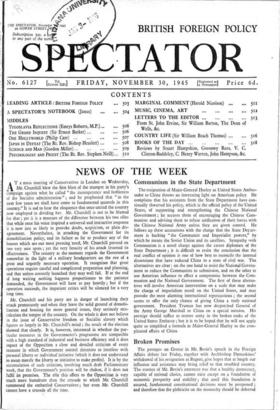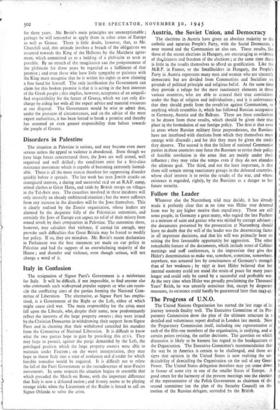Broken Promises
The passages on Greece in Mr. Bevin's speech in the Foreign Affairs debate last Friday, together with Archbishop Damaskinos' withdrawal of his resignation as Regent, give hopes that at length our influence and assistance may bring relief to that troubled country. The essence of Mr. Bevin's statement was that a healthy democracy, capable of rational choice, cannot exist except on a foundation of economic prosperity and stability ; that until this foundation is assured, fundamental constitutional decisions must be postponed ; and therefore that the plebiscite on the monarchy should be deferred for three years. Mr. Bevin's main principles are unexceptionable ; perhaps he will remember to apply them in other areas of Europe as well as Greece. There is little doubt, however, that, as Mr. Churchill said, this attitude involves a breach of the obligations we assumed towards the King of the Hellenes by the Marchesa agree- ment, which committed us to a holding of a plebiscite as soon as possible. By no stretch of the imagination can the postponement of the plebiscite for three years be regarded as a fulfilment of that promise ; and even those who have little sympathy or patience with the King must recognise that he is within his rights in now claiming a free hand for himself. The only justification the Government can claim for this broken promise is that it is acting in the best interests of the Greek people ; this implies, however, acceptance of an unquali- fied responsibility for the future of Greece, which we can only dis- charge by aiding her with all the expert advice and material resources at our disposal. The Government would be wise to admit that, under the pressure of circumstances, and on the advice of the most expert authorities, it has been forced to break a promise and thereby has assumed an even greater responsibility than before towards the 'people of Greece.































 Previous page
Previous page